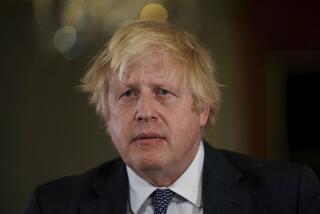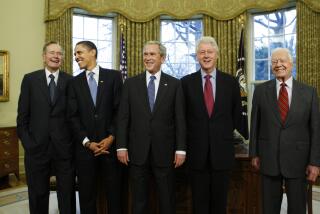Tony Blair reemerges with memoir
- Share via
LONDON — He owns several homes in Britain but spends most of his time abroad. He led the Labor Party to victory three times at the polls but was virtually invisible during the last election. He dominated British airwaves for a decade but has faded from view.
Still, Tony Blair knows how to grab the spotlight when he wants to, and this week, the famous megawatt smile and shrewd eyes are about to be omnipresent once again, along with a lot more gray hair.
The former prime minister’s face will gaze out from bookstore windows everywhere with the release Wednesday of his much-anticipated memoir. Pundits, old colleagues, friends and foes are eagerly awaiting their chance to sift through 600-plus pages for revelations, recriminations and regrets of a decade at the pinnacle of British politics.
So far, neither author nor publisher has given anything away.
Even so, Blair has managed to stir the waters before the book’s release, giving a huge boost to pre-sale orders but offering his compatriots a reminder of just how divisive and controversial a figure he has remained since stepping down from office three years ago.
He received a staggering $7-million advance for writing “Tony Blair: A Journey.” (The original title had it as “The Journey,” but was modified after criticism that it sounded too self-aggrandizing even for him.) In his detractors’ eyes, the massive windfall was yet another crass example of the Blair Rich Project, his allegedly relentless campaign to amass a fortune on the back of his reputation and connections.
But Blair flummoxed everyone this month by announcing that his advance fee and all other proceeds from the book would be donated to the Royal British Legion; specifically, to a rehabilitation center for wounded veterans.
It was “the good deed that shocked the nation,” as the Daily Telegraph put it, coming as it did from a leader who took his country into two unpopular wars, in Iraq and Afghanistan.
Suddenly, Blair was front-page news again. Reaction to the donation was instant, much of it negative, with the father of a fallen soldier calling it “blood money” and others declaring it Blair’s attempt to salve his conscience over joining the United States in going to war in Iraq based on discredited evidence.
Within hours, the book shot up to the top 10 sellers on Amazon’s British site. (It’s slipped back down a bit since then.)
“It’s a very questionable PR move, because people are bound to say he’s trying to buy his way out of trouble,” said Anthony Howard, a historian. “I can see what was in it for ... the publishers. I’m amazed that Blair’s advisors didn’t say, ‘Hold on a minute; let’s think this through.’ ”
Those more sympathetic to the former leader say the donation sprang from a genuine respect and admiration for the armed forces. They scoff at suggestions that it represents an oblique apology, and complain that no matter what Blair does, a rabid clique of critics and their followers will hasten to find fault.
“Not only do they hate him for making so much money, they hate him for giving away 5 million pounds of it,” said John Rentoul, a biographer of Blair. “What I find bizarre and offensive is that somehow it’s an admission of guilt, which is just the antiwar reading of motives into it from the man they love to hate.”
In truth, anyone looking for an expression of remorse in the book will probably come away disappointed. Blair has never backed down from his contention that the 2003 invasion of Iraq was justified, a view he emphatically repeated in January while giving testimony before an independent panel charged with investigating the march to war.
Seven years ago, hundreds of thousands of people rallied in London to protest Blair’s decision to send in British troops. Only several dozen demonstrators showed up to inveigh against him at the panel hearing, which shows that anger over the issue may be fading but still persists.
“You mention the name Tony Blair and you can still hear the hissing, you can still hear the booing,” said John Curtice, an expert on British politics at the University of Strathclyde, in Scotland. “He is somebody to whom people now react in a way that they also reacted to [Margaret] Thatcher,” whom many Brits still vilify 20 years after she left office.
But Curtice said the Blair-hating frenzy that dogged his final years in power has cooled a bit with the passage of time and the withdrawal of British troops from Iraq.
Naturally fading memories are one reason for a reduction in hostility. Another is that Blair has kept a relatively low profile domestically since retiring from party politics. Instead, he has thrown himself into international endeavors that have him globetrotting three weeks out of four: projects on good governance in Africa, efforts as a special envoy to the Middle East, conferences on climate change.
Next month, he’s scheduled to accept the prestigious Liberty Medal in the United States, a country in which he is generally received with greater warmth and enthusiasm than he is at home. President Clinton, another leader who elicits passionate reactions, will present the award.
Like Clinton, Blair is a much-sought-after and charismatic speaker, reportedly commanding fees of more than $200,000 for a single appearance. He has also signed extremely lucrative contracts as a consultant to firms such as JP Morgan and to the governments of Kuwait and Saudi Arabia.
His wealth, by one estimate, is about $23 million. The money helps pay for a large personal staff, office space in central London and mortgages on a stately home in the affluent county of Buckinghamshire and a flat in one of the toniest districts of London, among other properties.
That has given rise to the most commonly heard criticism of him these days here in Britain, which isn’t that he authorized the invasion of Iraq but that he has morphed into Blair Inc.
“We don’t like people earning money in this country, and the fact is that if a former prime minister made 20 million, [Britons] don’t like that,” said Howard, the historian. “You don’t have that problem with presidents in America. We’re much more mean-minded.”
Blair has said much the same thing about his countrymen. He says that he tries not to let the carping get to him. But perhaps it’s little wonder that he spends so much time abroad.
“It’s not true that nobody likes me! Reading the papers in Britain, you’d end up thinking I’d lost three elections rather than won them. There is a completely different atmosphere around me outside the country,” Blair told the Times of London late last year.
“You get to a position where the criticism you get, you just have to live with. It’s the way it is. When you are someone like me, you create a lot of controversy one way or another. You just decide to do what you are going to do and let that speak for itself.”
More to Read
Sign up for our Book Club newsletter
Get the latest news, events and more from the Los Angeles Times Book Club, and help us get L.A. reading and talking.
You may occasionally receive promotional content from the Los Angeles Times.







